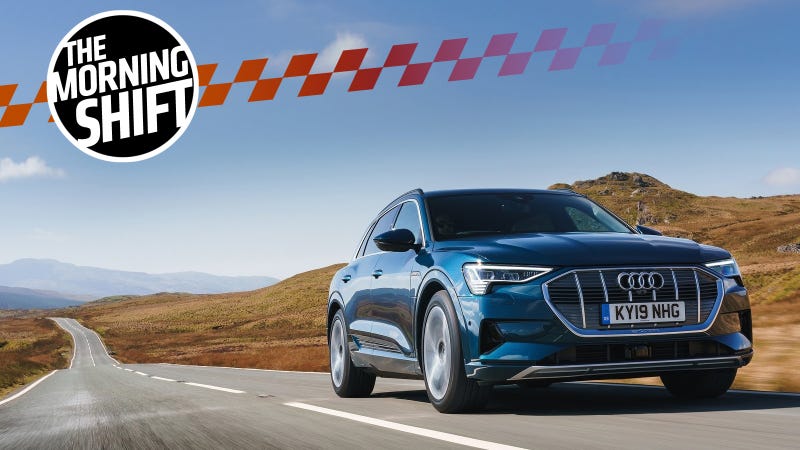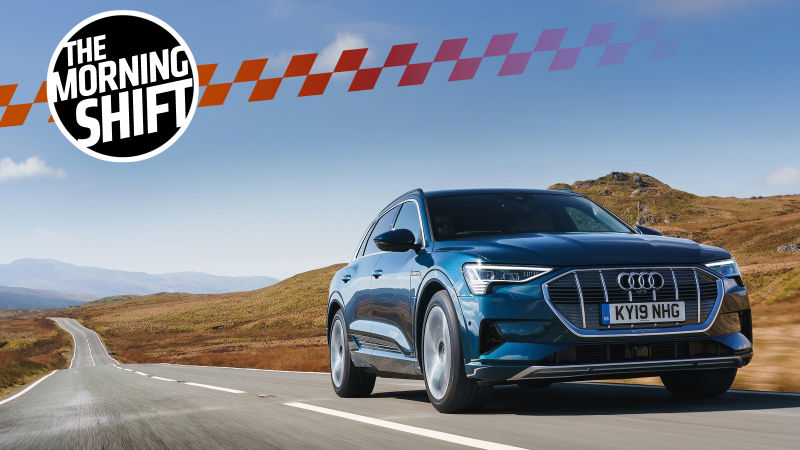
 The Morning ShiftAll your daily car news in one convenient place. Isn’t your time more important?
The Morning ShiftAll your daily car news in one convenient place. Isn’t your time more important? Audi is in a sales slump, Panasonic isn’t very optimistic, President Donald Trump’s announcement about the startup that could “save” General Motors’ Lordstown plant lands with a thud and more for The Morning Shift of Thursday, May 9, 2019.
1st Gear: Audi Has to Get Its Groove Back
The war for who’s the top-selling luxury brand is always a brutally contested one, but Audi’s had several problems as of late. For one, it’s in the middle of several model changeovers and updates. It’s also still recovering from an expensive diesel cheating scandal that cost it $895 million in fines and several executives. And then there’s the fact that car sales are down globally, especially in ultra-important China.
So don’t envy Audi’s new CEO, Bram Schot, because he has a lot of work to do. From Bloomberg:
Monthly deliveries dropped to 140,300 cars because of a challenging market environment and a number of model changeovers, Audi said Thursday in a statement. Sales since the start of the year have declined 5.9%, likely pushing VW’s biggest profit center to fall further behind rivals Mercedes-Benz and BMW AG.
Audi has been struggling to put fallout from the 2015 diesel-emissions scandal behind it, with a tumultuous 2018 that involved the arrest of former CEO Rupert Stadler and a 800 million euro ($895 million) fine.
Advertisement
One wonders how much Schot and his team can do when things are kinda bad everywhere.
2nd Gear: Panasonic Predicts Downturn Too
Meanwhile, Panasonic, the Japanese electronics giant and exclusive battery partner for Tesla, is also pessimistic about sales and profits in the auto industry this year. From Reuters:
The Japanese conglomerate expects operating profit for the year through March 2020 to slump 27 percent to 300 billion yen ($2.7 billion) from a year earlier. That is well below analyst expectations of a 12 percent decline, according to Refinitiv.
The company is looking at a 15 billion yen loss at its automotive unit this year, it said on Thursday. Panasonic expects costs to ramp up battery production in Japan and China for a planned electric-vehicle (EV) battery joint venture with Toyota Motor Corp to weigh heavily.
[…] “Over the last three years, we aimed for stable revenue and profit growth focusing mainly on the automotive business … but development costs and insufficient abilities to adjust to rapid battery production expansion limited our profits,” Panasonic President Kazuhiro Tsuga said.
Advertisement
Tesla and Panasonic have feuded openly at times, which is rare between an automaker and its major supplier, but Tsuga claims relations are good. Still, it shows EV development and manufacturing costs are staggering, and certainly not helped by slumping sales right now.
3rd Gear: China Lags in Autonomous Vehicles
Speaking of China, while the world’s biggest new car market is focused far more heavily on electric cars than the U.S. is, we’re still the current leader in developing autonomous vehicle technology. This Bloomberg story recounts an incident where a Chinese startup’s autonomous test vehicle “froze” in an intersection, and what it means for the tech as a whole:
Though disaster was averted, the incident shows how China’s push into autonomous vehicles is barely out of first gear, with only a handful of cities allowing limited trials by search-engine giant Baidu, startup Pony.ai, trucker TuSimple Inc. and others since last year. Domestic and foreign testers are putting cars, buses, trucks and delivery vans through self-driving trials to teach them how to navigate the notoriously congested streets of the world’s biggest auto market.
The nation is getting a late start in the burgeoning field, considering California has allowed public-road testing since at least September 2014. That’s enabling U.S. developers to lap their China counterparts, with Alphabet Inc.’s Waymo LLC logging millions of cumulative test miles in that state alone. But China’s chaotic traffic has the potential to boost the self-driving industry’s capabilities beyond those of the U.S.
“The U.S. is ahead right now,’’ said Bill Russo, chief executive officer of Shanghai-based consultancy Automobility Ltd. “But China will soon make significant strides, and I am fully confident that by 2030 it will be a different game.’’
Advertisement
Baidu, effectively the Google of China, is one of the big players trying to catch up. But they have plenty of roadblocks:
The leading tester in China is Baidu, which covered about 140,000 kilometers (87,000 miles) in Beijing last year -– less than a typical month for Waymo. No accidents have been reported. Foreign companies such as Daimler AG and BMW AG also test, but their roadwork is limited.
China’s permitting process is particularly cumbersome, said Neil Wu, a Shanghai-based partner at consultancy Roland Berger.
Local authorities require each car to accumulate some miles on closed tracks and to pass several tests before granting public-road permits, and some cities require companies to renew those permits every three months.
“The current rules on public-road testing in China are limiting the amount of data and number of traffic scenarios, the two key factors for improvement in the intelligence level of robocars,’’ Wu said.
Advertisement
4th Gear: More Bad News for Mazda
Yes, I know every Morning Shift as of late has been drilling home How Bad Things Are for the auto industry, even though the economy as a whole is said to be “booming.” I see that as a precursor to a wider range of bad news, but what do I know!
Advertisement
Anyway, the latest car company taking a profit hit is poor Mazda, which is trying to rebrand as a more premium automaker in the U.S. and retool its dealer network. From Automotive News:
Mazda said operating profit slumped 43 percent in the latest fiscal year, with results broadsided by falling global sales, increased marketing expenses, foreign exchange losses and spiraling costs for increased investment in its U.S. retail network reforms.
Mazda operating profit dropped to 83.01 billion yen ($748.9 million) in the full fiscal year ended March 31, the automaker said on Thursday in its earnings report.
Net income also slid 43 percent, to 63.48 billion yen ($573.0 million) in the 12 months. Revenue increased 3 percent to 3.56 trillion yen ($32.12 billion), as worldwide retail sales declined 4 percent to 1.56 million units, losing ground in North America and China.
Advertisement
Blame incentives, which are always bad, and currency fluctuations.
Incentives further dented profitability in the latest fiscal year. Mazda is trying to rein in incentive spending as part of a push to boost the brand image. In the first three months of 2019, Mazda scaled back incentives 23 percent, according to figures from Autodata. But in the 2018 calendar year, spiffs increased 11 percent.
Meanwhile, the Japanese yen’s appreciation against the U.S. dollar and other currencies took another bite. Exchange rates cut 38.1 billion yen ($343.8 million) off the full-year profit.
Advertisement
Hang in there, Mazda. You’re one of the good ones.
5th Gear: Uh, Who?
General Motors’ Lordstown, Ohio plant closure has left a bad taste in a lot of mouths. Workers are angry other countries are getting GM cars to make while they’re left in the lurch. Taxpayers are mad post-bailout GM is shipping jobs overseas. And President Donald Trump won that area handily in 2016, and he’s the jobs and economy guy, so he wants that shit fixed and soon.
Advertisement
Too bad his announcement (a vastly premature one, as we reported yesterday) that EV mail truck startup Workhorse could take over the plant not only came as a shock to many, but it wasn’t the news that area folks were after.
From Bloomberg:
When President Donald Trump tweeted that General Motors Co. was on the verge of selling its idled car plant in Lordstown, Ohio, to a tiny electric truckmaker, David Green had no idea it was coming.
The president of United Auto Workers Local 1112 in Lordstown — who Trump attacked on Twitter two months ago — is among a handful of workers whose job is to do maintenance at the inactive compact car factory that made its last Chevrolet Cruze in March. He was left in the dark about GM’s talks to sell the factory.
“I haven’t heard anything about it,” Green said by phone Wednesday. “I’m out in the plant cleaning.”
[…] Judging from the UAW’s initial response, both GM and Trump are going to have a hard time painting a future sale to money-losing Workhorse as a win, said Harley Shaiken, a labor relations professor at University of California at Berkeley.
GM is contractually prevented from closing or selling the plant until its current four-year labor deal with the UAW expires in September. The union will probably use the sale as leverage on other issues, rendering talks that were already expected to be contentious even testier.
Advertisement
Here is what they want:
The remaining GM employees who are on layoff likely would prefer to stay on with GM, keeping their seniority, benefits and wages. It’s unclear if Workhorse could afford to pay what a GM labor contract guaranteed, Shaiken said.
Meanwhile, the new Chevrolet Blazer is built in Mexico.
Reverse: This Used to Be Really Hard to Do
Advertisement
Neutral: What Should Happen in Lordstown?
What’s the ideal outcome for that plant in Ohio and its workforce?













